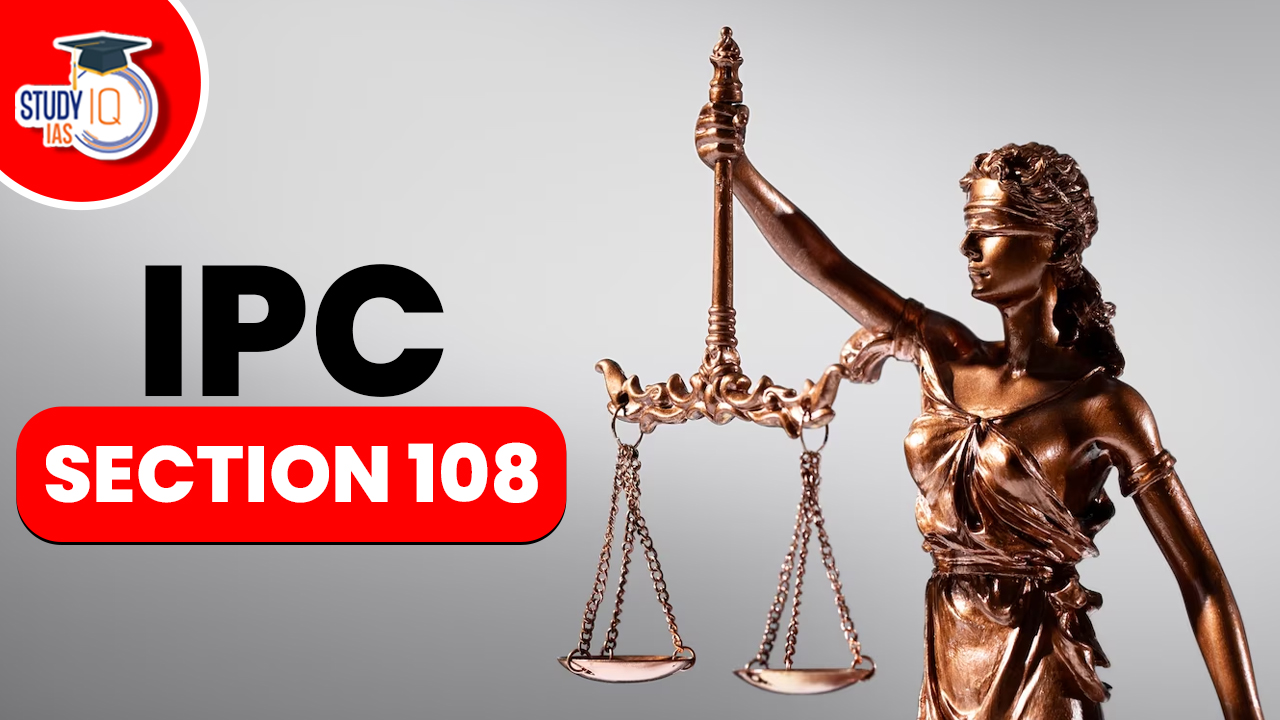Table of Contents
IPC Section 108 of Indian Penal Code
Section 108 of the Indian Penal Code (IPC) plays an important role in the legal landscape of India. This section deals with a specific aspect related to criminal law and the actions of individuals in connection with criminal acts. Understanding its provisions is essential for comprehending how the law addresses various situations where people are involved in aiding or encouraging the commission of offences. In this article, we will delve into the key aspects and implications of Section 108 of the IPC to gain a clearer perspective on its significance in the realm of criminal justice.
IPC Section 108 Explanation
IPC Section 108 of the Indian Penal Code (IPC) deals with the concept of “Abettor” and the act of abetment in the context of criminal offences. Here’s a breakdown of the section along with explanations and illustrations:
Section 108 Abettor
A person abets an offence, who abets either the commission of an offence or the commission of an act which would be an offence if committed by a person capable by law of committing an offence with the same intention or knowledge as that of the abettor.
Explanation 1: The abetment of the illegal omission of an act may amount to an offence even if the abettor may not be bound to do that act.
Explanation 2: To constitute the offence of abetment, it is not necessary that the act abetted should be committed, or that the effect requisite to constitute the offence should be caused.
Explanation 3: It is not necessary that the person abetted should be capable by law of committing an offence, or that he should have the same guilty intention or knowledge as that of the abettor, or any guilty intention or knowledge.
Explanation 4: The abetment of an offence being an offence, the abetment of such an abetment is also an offence.
Explanation 5: It is not necessary to the commission of the offence of abetment by conspiracy that the abettor should conspire with the person who commits it. It is sufficient if he engages in the conspiracy in pursuance of which the offence is committed.
Illustrations
The section provides several illustrative scenarios to help understand the concept of abetment:
- Instigating Murder: A instigates B to murder C. Even if B refuses to do so, A is guilty of abetting B to commit murder.
- Act Following Instigation: A instigates B to murder D. B stabs D as a result of the instigation, but D survives. A is guilty of instigating B to commit murder.
- Abetment of a Child: A abet a child or a lunatic to commit an act that would be an offence if committed by a person capable of committing an offence. A is guilty of abetting an offence, whether the act is committed or not.
- Instigating a Child to Kill: A instigates a child under seven years of age to cause Z’s death. Despite the child not being legally capable of committing an offence, A is liable for punishment as if the child had committed murder.
- Unsound Mind and Abetment: A instigates B, who is mentally unsound, to set fire to a dwelling-house. B, due to his unsound mind, sets fire to the house. B commits no offence, but A is guilty of abetting the offence of setting fire to a dwelling-house.
- Abetting Theft: A intends to cause theft and instigates B to take property from Z’s possession, falsely claiming it as A’s property. Even though B’s actions do not constitute theft, A is guilty of abetting theft.
- Chain of Abetment: A instigates B to instigate C to murder Z. B instigates C, who commits the murder. Both A and B are liable for the murder as abettors.
- Conspiracy and Abetment: A and B conspire to poison Z. A administers the poison, resulting in Z’s death. Even though A and C did not conspire together, C’s involvement in the conspiracy makes him liable for abutment.
Section 108 of Companies Act 2013
Section 108 of the Companies Act, 2013, pertains to the procedure for the transfer of shares and debentures in a company. This section lays out the requirements and conditions under which a company can register the transfer of shares and debentures from one party to another. Here’s a breakdown of the key points in Section 108:
- A company is prohibited from registering the transfer of shares in, or debentures of, the company unless a proper instrument of transfer is submitted.
- The instrument of transfer should be duly stamped and executed by both the transferor and the transferee, and it should include the details of the transferee, such as their name, address, and occupation.
- The instrument of transfer must be submitted to the company along with the relevant certificate of shares or debentures. If there is no certificate, the letter of allotment should be submitted instead.
- The section contains provisions for cases where the instrument of transfer has been lost. The company may register the transfer if the Board of Directors is satisfied that the transferor and transferee have executed the instrument, even if the physical document has been lost.
Explanation
Explanation 1: The abetment of the illegal omission of an act may amount to an offence, even if the abettor is not bound to do that act.
Explanation 2: The offence of abetment can be established even if the act abetted is not actually committed or if the effect required to constitute the offence is not caused.
Explanation 3: It’s not necessary that the person abetted (the one receiving encouragement to commit the offence) should be capable by law of committing the offence or have the same intention or knowledge as the abettor.
Explanation 4: Abetment of an offence is also considered an offence, and the abetment of such an abetment is itself an offence.
Explanation 5: The offence of abetment by conspiracy doesn’t require the abettor to conspire directly with the person who commits the offence. Engaging in the conspiracy that leads to the offence’s commission is enough to establish liability.
Section 108 of Transfer of Property Act
Section 108 of the Transfer of Property Act, of 1882, outlines the rights and liabilities of lessors (landlords) and lessees (tenants) concerning immovable property (real estate) in the absence of any contrary contract or local usage. This section establishes the rights and obligations of lessors and lessees with respect to each other. Here’s a breakdown of the key points in Section 108:
Rights and Liabilities of the Lessor (Landlord)
- The lessor is obligated to disclose any significant defects in the property to the lessee if those defects are not known to the lessee and could not have been discovered by them with ordinary care.
- Upon the lessee’s request, the lessor must put the lessee in possession of the property.
- The lessor implicitly contracts that if the lessee pays the rent and fulfils the agreements specified in the lease, they may occupy the property throughout the lease’s duration without interruption. This contract’s benefit is attached to the lessee’s interest in the property and can be enforced by anyone holding that interest.
Rights and Liabilities of the Lessee (Tenant)
- If any addition is made to the property during the lease period, that addition is considered part of the lease.
- If a substantial part of the property is destroyed by fire, tempest, flood, violence, or other forces beyond the lessee’s control, the lessee has the option to void the lease.
- If the lessor fails to make necessary repairs in a reasonable timeframe after receiving notice, the lessee can make the repairs themselves and deduct the cost from the rent or recover it from the lessor.
- If the lessor fails to make a payment that is legally recoverable from the lessee or the property, the lessee can make the payment and deduct it from the rent or recover it from the lessor.
- The lessee has the right to remove any attached fixtures from the property during the lease, as long as the property is left in the condition it was received.
- Upon the termination of an uncertain-term lease (except due to the lessee’s fault), the lessee is entitled to all crops planted or sown on the property and has the right to access the property to gather them.
- The lessee can transfer, mortgage, or sub-lease their interest in the property and the transferee’s interest can also be transferred. However, this doesn’t exempt the original lessee from lease liabilities.
- The lessee must disclose to the lessor any information that increases the value of the lessee’s interest in the property.
- The lessee is required to pay rent or premium at the proper time and place to the lessor or their agent.
- The lessee must maintain and restore the property in good condition, allowing the lessor to inspect the property and report any defects.
- If the lessee is aware of any proceedings affecting the property or the lessor’s rights, they must inform the lessor.
- The lessee can use the property and its products reasonably, but not for purposes other than those for which it was leased or in ways that cause permanent damage.
- The lessee must not construct permanent structures on the property without the lessor’s consent, except for agricultural purposes.
- Upon lease termination, the lessee must return the property to the lessor’s possession.
This section governs the rights and responsibilities of lessors and lessees in the absence of specific agreements or local customs to the contrary. It provides a framework for the basic expectations and obligations between landlords and tenants when it comes to leasing immovable property.
Section 108 of Indian Evidence Act
Section 108 of the Indian Evidence Act, of 1872, pertains to the burden of proving that a person is alive when there has been no information about their whereabouts for a continuous period of seven years. The section establishes the legal principle that when the question arises as to whether a person is alive or dead, it is established that the person has not been heard of for seven years by those who would naturally have heard of them if they were alive, the burden of proving that the person is alive shifts to the person who asserts or affirms that they are alive.
In simpler terms, if someone’s whereabouts are unknown for a continuous period of seven years and there is no information about them from individuals who would likely have knowledge of their existence, the burden of proving that the person is still alive falls on the person claiming that the individual is alive.
This legal provision is particularly relevant in cases where the question of a person’s survival or death is significant, such as matters related to inheritance, property rights, insurance claims, and similar legal situations. It helps establish a reasonable threshold for considering a person as legally deceased in situations where there is a lack of evidence regarding their continued existence.
Section 108 of Customs Act
Section 108 of the Customs Act, 1962, empowers a gazetted officer of customs, authorized by the Central Government, to summon individuals for the purpose of giving evidence or producing documents or other items in any inquiry conducted under the provisions of the Customs Act.
Key Points of Section 108 of Customs Act
- Summoning Authority: Any gazetted officer of customs authorized by the Central Government has the power to summon individuals to provide evidence or produce documents or other items relevant to an inquiry being conducted under the Customs Act.
- Summon to Produce Documents or Things: The summons issued can require the person to produce specific documents or items, or it can be a general summons for the production of all documents or items of a certain description that are in the possession or under the control of the person summoned.
- Attendance and Statement: Those summoned are legally obligated to attend the inquiry either in person or through an authorized representative as directed by the officer. They are required to provide truthful information about the subject matter under inquiry and to produce the requested documents and items.
- Applicability of Exemption: The exemption provided under Section 132 of the Code of Civil Procedure, 1908, is applicable to the requisition for attendance under this section. This exemption pertains to privileged communications and applies when certain individuals are protected from being compelled to disclose certain communications or documents in certain legal proceedings.
- Judicial Proceeding: The inquiry conducted under this section is considered a judicial proceeding for the purposes of Sections 193 and 228 of the Indian Penal Code (IPC). These sections deal with the punishment for giving false evidence and intentionally providing false information to a public servant, respectively.
IPC Section 108 UPSC
Understanding IPC Section 108 is of paramount importance for UPSC aspirants, as it is a pivotal component of the Indian Penal Code, a subject extensively covered in the UPSC Syllabus for both Prelims and Mains. A firm grasp of this topic is crucial for effectively navigating questions related to criminal law in UPSC actual examinations. Moreover, incorporating this knowledge through UPSC Online Coaching can greatly enhance one’s legal acumen, contributing to a well-rounded preparation strategy.


 SLAPP Suits: Meaning, Examples, Impact o...
SLAPP Suits: Meaning, Examples, Impact o...
 Finance Commission of India, Articles an...
Finance Commission of India, Articles an...
 High Number of Pending Cases in Supreme ...
High Number of Pending Cases in Supreme ...

























